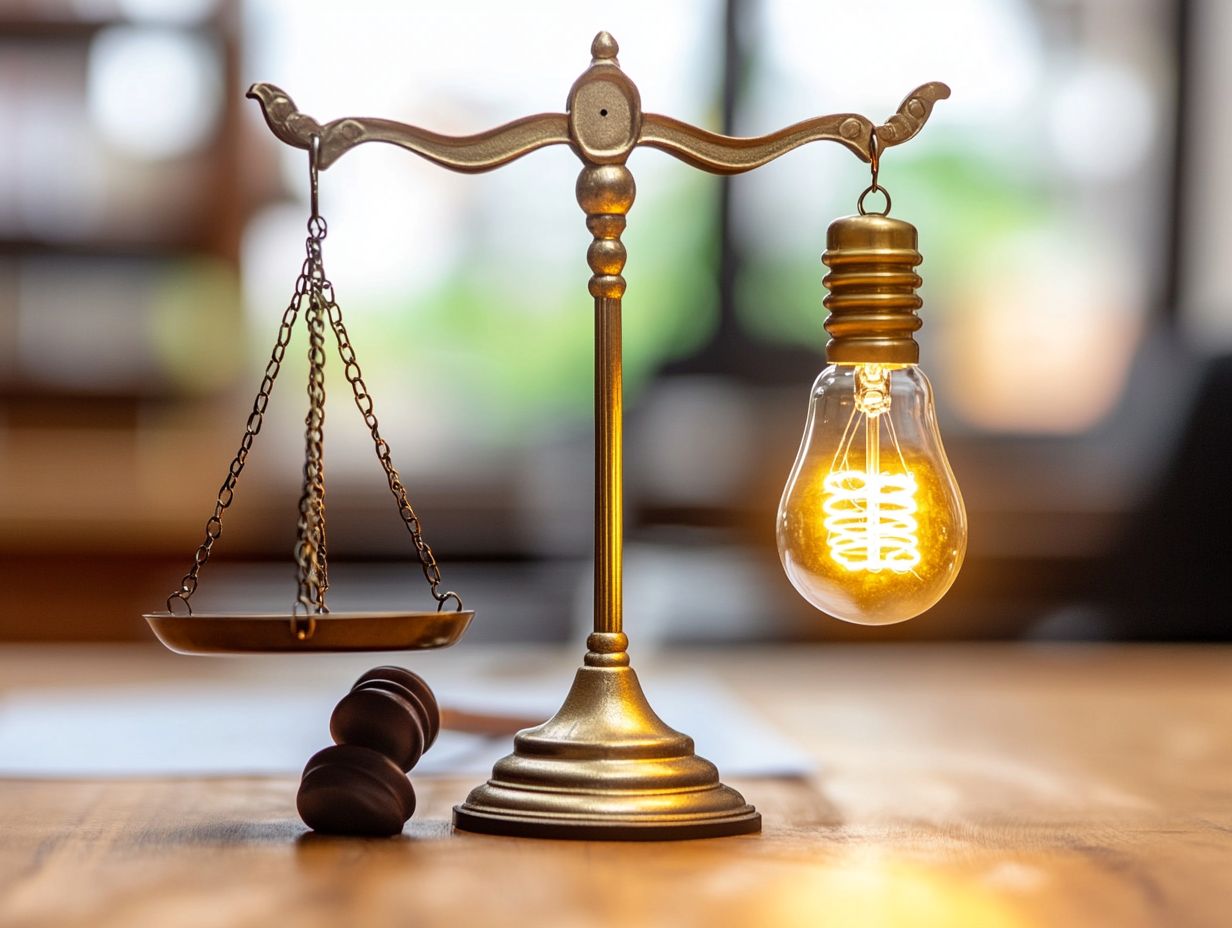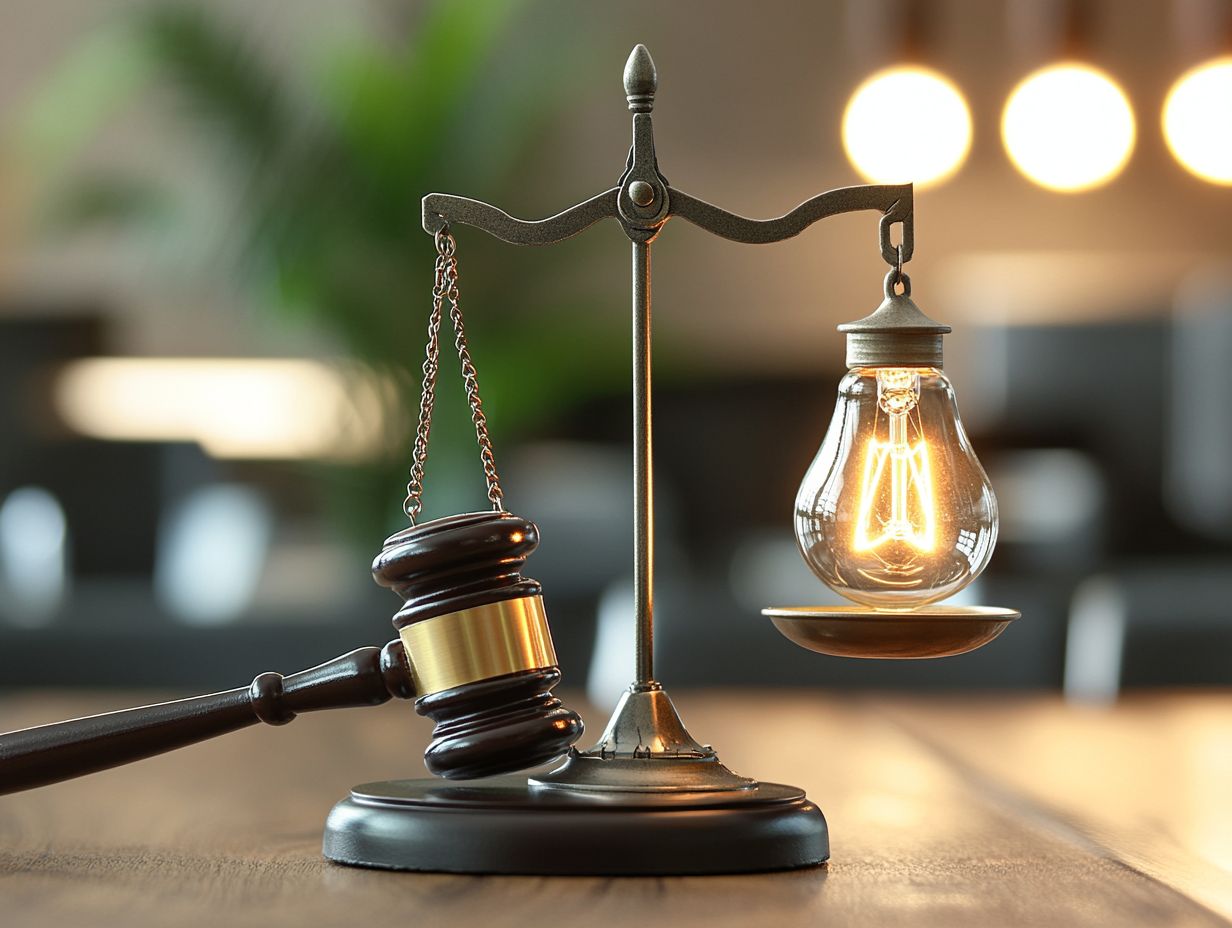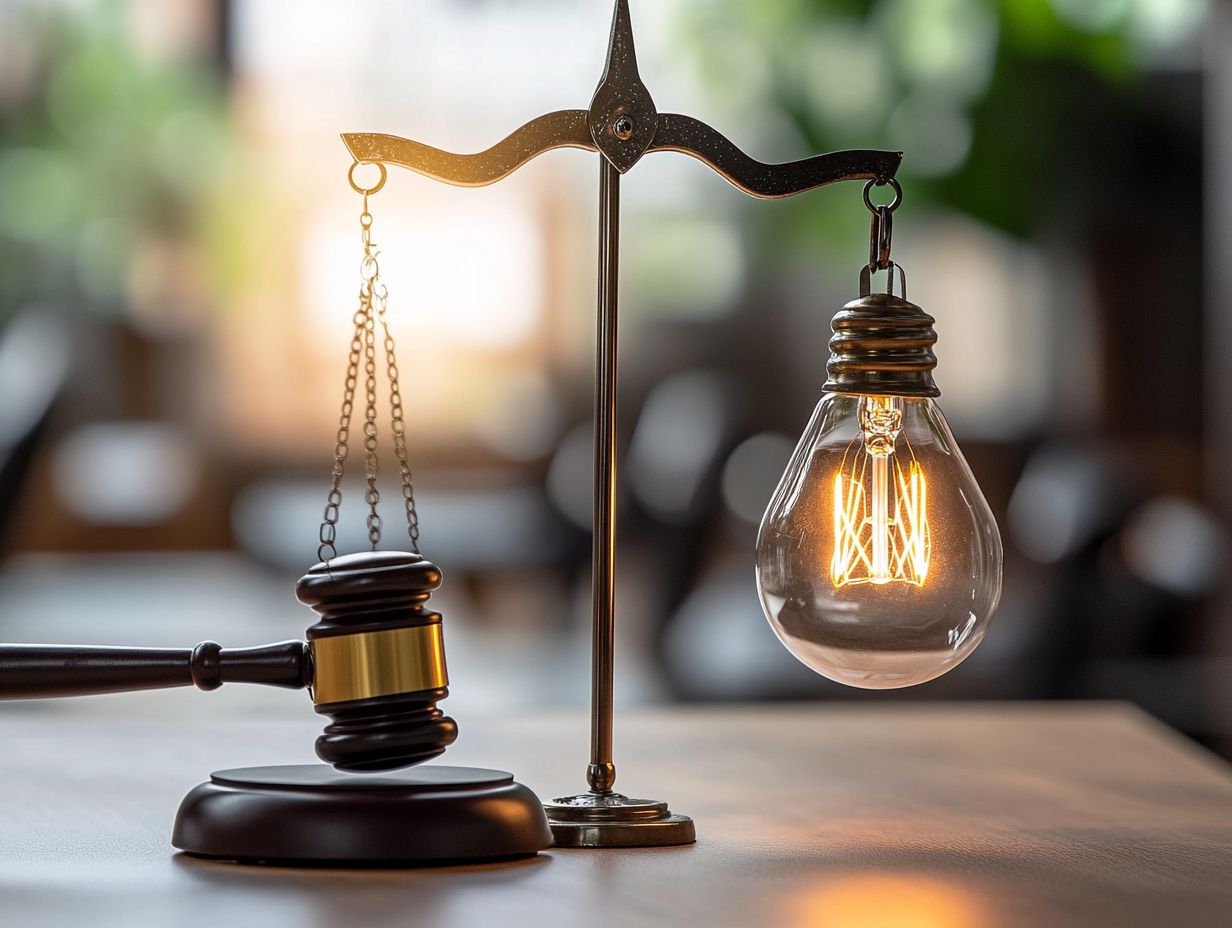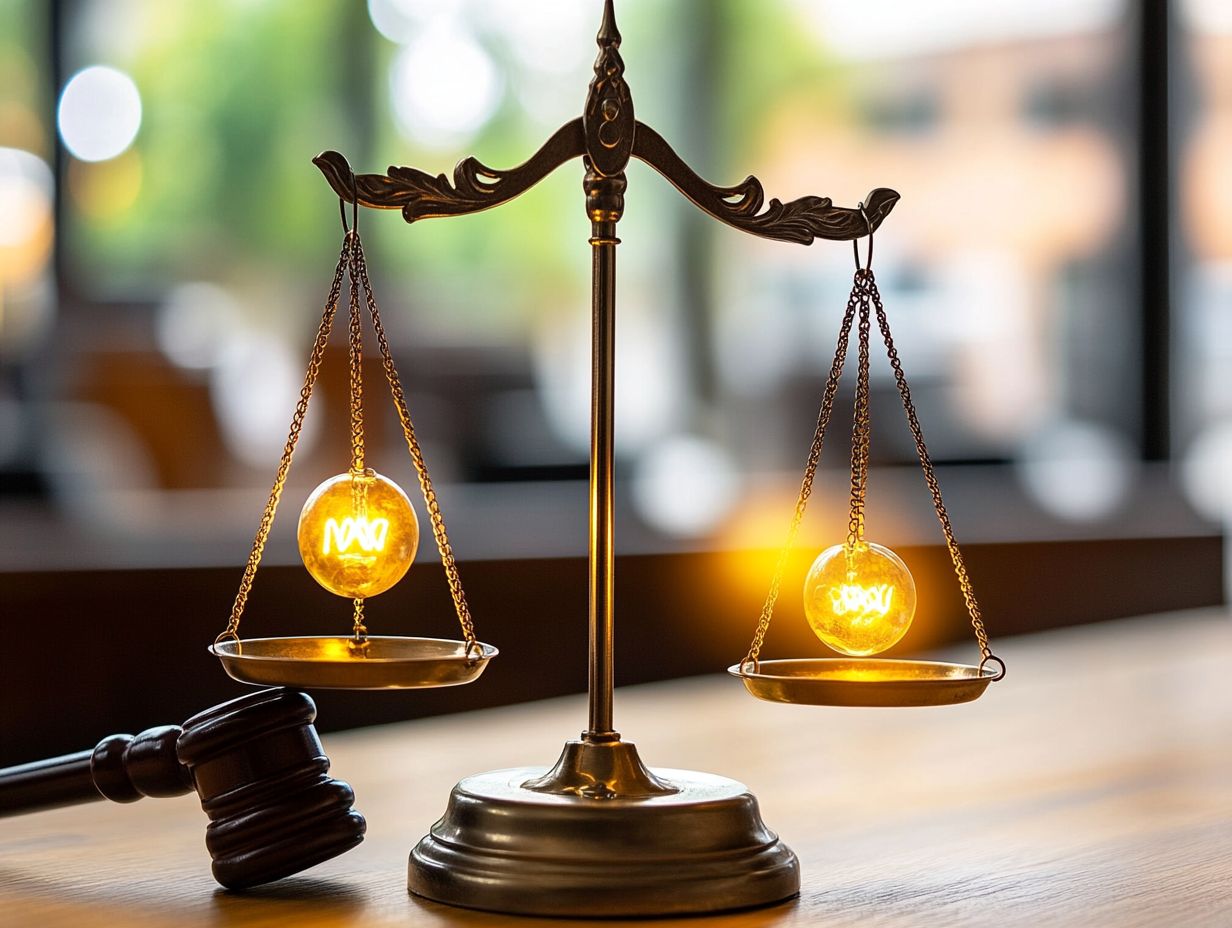The Ethics of IP Litigation: A Balancing Act
Intellectual property (IP) refers to creations of the mind like inventions, designs, and brand names. IP litigation is a crucial domain where innovation intersects with the law, presenting complex questions about rights and duties.
This discussion delves into the essential role of ethics in IP disputes. Fairness is significant for both plaintiffs and defendants. You will explore the nuances of protecting intellectual property while navigating the complexities of fair competition and addressing ethical considerations that affect all parties involved.
Engage with us as we unravel the responsibilities of legal professionals and the ethical framework that defines IP litigation.
Contents
- Key Takeaways:
- Overview of IP Litigation
- The Role of Ethics in IP Litigation
- Balancing Interests: Plaintiffs vs Defendants
- Ethical Considerations for Plaintiffs
- Ethical Considerations for Defendants
- The Role of Lawyers in Ethical IP Litigation
- Frequently Asked Questions
- What is meant by “The Ethics of IP Litigation: A Balancing Act”?
- Why is it important to consider ethics in IP litigation?
- What ethical challenges do lawyers face in IP litigation?
- How can attorneys balance their duty to their clients with their ethical obligations in IP litigation?
- What are the consequences of unethical behavior in IP litigation?
- How can parties involved in IP litigation ensure ethical behavior?
Key Takeaways:

Ethical conduct in IP litigation is crucial for maintaining fairness and preserving the integrity of the legal system. Plaintiffs must balance their interests in protecting their intellectual property with ethical considerations to avoid abusive tactics. For a deeper understanding of this balance, explore the intersection of IP litigation and fair use. Defendants must also navigate ethical issues to prevent infringement and unfair competition.
Overview of IP Litigation
IP litigation involves the complex legal processes associated with safeguarding and enforcing intellectual property rights. This is particularly relevant in claims about patents that frequently arise between patent holders and those who infringe upon these rights.
Understanding IP litigation is vital for your business. You need to secure your innovations while grappling with the challenges posed by market dynamics.
Understanding the implications of patent litigation gives you the power to defend your intellectual property against potential infringement. It also fosters an environment that promotes innovation protection and establishes a competitive advantage.
Definition and Importance
The realm of IP litigation encompasses various legal disputes linked to intellectual property. This is especially true for patent claims that can profoundly influence your business operations and growth.
Engaging in this process is essential for preserving market exclusivity, the right to be the only one selling a product or service. By championing these legal safeguards, you nurture creativity and development, ultimately strengthening your market position.
IP litigation acts as a cornerstone within the legal framework of intellectual property. This fosters fair competition and encourages overall business growth and sustainability in the marketplace.
The Role of Ethics in IP Litigation
Ethics holds a pivotal position in IP litigation. It shapes decisions surrounding patent claims, guides the behavior of patent holders, and highlights the importance of IP education in litigation, impacting the broader perception of the legal landscape within the industry.
Your understanding of ethical considerations can significantly influence the outcomes of legal disputes and the reputation of all parties involved.
Why Ethics Matter
In IP litigation, ethics play a critical role by guiding the balance between protecting your intellectual property and ensuring fair competition. Understanding the importance of a strong IP policy in litigation is vital in a landscape where innovation flourishes, as upholding ethical standards becomes essential for fostering creativity and collaboration.
When you commit to ethical practices, you safeguard your own interests and contribute to a vibrant competitive environment that benefits everyone involved. Conversely, engaging in unethical practices can lead to legal complications, inviting expensive litigation and tarnishing reputations.
These challenges divert your focus from core business activities and discourage potential investors who value stability and integrity. Ultimately, adhering to ethical guidelines preserves the legitimacy of competition and establishes a solid foundation for sustainable growth and innovation.
Balancing Interests: Plaintiffs vs Defendants

Balancing the interests of plaintiffs and defendants in IP litigation is essential. Understanding the intersection of ethics and IP litigation profoundly impacts the outcomes of patent claims and the safeguarding of intellectual property rights.
You ll find that navigating this intricate landscape requires a nuanced understanding of the stakes involved for both sides.
Protecting Intellectual Property vs Protecting Fair Competition
The tension between protecting intellectual property and ensuring fair competition presents an ongoing problem in patent assertions.
This dichotomy often leads to disputes that can stifle innovation. Companies assert their patents to gain an upper hand, sometimes at the expense of smaller competitors.
Such assertions can create significant market exclusivity, creating barriers that hinder newcomers from entering the market. This consolidates power in the hands of a select few.
To navigate this complex landscape, consider using competitive strategies to understand market dynamics and potential threats while upholding ethical standards in protecting your intellectual property rights.
By ensuring clarity and transparency in your practices, you can foster an environment where innovation thrives alongside healthy competition. This ultimately benefits the entire industry.
Ethical Considerations for Plaintiffs
For plaintiffs engaged in IP litigation, ethical considerations are crucial. Take charge! Uphold your reputation by avoiding abusive litigation tactics that could compromise your credibility, as highlighted in the role of public perception in IP litigation.
Avoiding Abusive Litigation Tactics
Avoiding abusive litigation tactics is crucial to maintain ethical standards and keep your reputation strong in the IP litigation field.
Engaging in manipulative strategies like filing frivolous claims or using intimidation to force settlements can severely undermine the integrity of the legal process and the trust of the public and potential partners.
The consequences of such actions can lead to hefty financial penalties and reputational damage that extends far beyond the courtroom.
You must adhere to ethical practices to remain credible; this promotes transparency and fosters a fair environment where genuinely innovative ideas can flourish without the fear of unwarranted retaliation.
Ethical Considerations for Defendants
In the realm of IP litigation, you must navigate a landscape rich with ethical considerations. Avoiding patent infringement is crucial for your success, as well as steering clear of practices that could be seen as unfair competition.
Your vigilance is essential for maintaining integrity and upholding the principles of fair play in the competitive marketplace.
Avoiding Infringement and Unfair Competition

Avoiding infringement and promoting fair competition is essential as you navigate the complexities of patent litigation.
To successfully maneuver through these legal intricacies, adopt various strategies, such as conducting thorough market research and analyzing existing patents relevant to your field.
By grasping market dynamics, you can pinpoint potential areas of conflict and design your products or services to sidestep any troublesome overlaps.
Upholding ethical practices is vital for maintaining competitive integrity; adhering to these principles builds trust and bolsters your company s reputation.
Ultimately, making informed decisions based on a solid understanding of both your legal obligations and the competitive landscape can significantly minimize the risk of infringement claims.
The Role of Lawyers in Ethical IP Litigation
Lawyers hold a crucial position in upholding ethical standards in IP litigation, expertly guiding both plaintiffs and defendants through the intricate legal landscape.
With a keen emphasis on professional responsibilities and best practices, they navigate the complexities of the law to ensure fair and just outcomes.
Professional Responsibilities and Best Practices
Professional responsibilities and best practices for lawyers in IP litigation underscore the importance of ethical conduct.
Your responsibilities encompass thorough representation, which requires not just a deep understanding of patent law. You must also foster a transparent relationship with your clients.
For instance, you should consistently communicate both the strengths and weaknesses of a case. This ensures that your clients are well-informed and equipped to make strategic decisions.
Compliance with legal standards is paramount. You must steer clear of conflicts of interest and guarantee that all submissions to the court are accurate and truthful.
Regular training in ethical obligations and active participation in professional integrity programs can significantly enhance your ability to navigate patent litigation responsibly. This commitment ultimately contributes to an environment of fairness and justice.
Frequently Asked Questions
Here are answers to common questions about ethics in IP litigation.
What is meant by “The Ethics of IP Litigation: A Balancing Act”?
The Ethics of IP Litigation refers to the moral principles and standards that should guide the actions and decisions of attorneys and other parties involved in a case related to intellectual property. For a deeper understanding, it’s important to explore what the ethical considerations in IP law are, as it often involves navigating complex legal and ethical issues while also upholding the rights of all parties involved.
Why is it important to consider ethics in IP litigation?

Ethics play a crucial role in IP litigation as they ensure fair and just treatment of all parties involved. They also help maintain the integrity of the legal system and promote trust and confidence in the legal process.
What ethical challenges do lawyers face in IP litigation?
Some common ethical issues include conflicts of interest, confidentiality, the right to keep communications between a lawyer and their client private, honesty and candor in court, and proper use of expert witnesses and evidence.
How can attorneys balance their duty to their clients with their ethical obligations in IP litigation?
Attorneys must always prioritize their ethical obligations over their duty to their clients. They must adhere to the rules and standards of professional conduct while representing their clients and avoid any actions that could compromise their ethical obligations.
What are the consequences of unethical behavior in IP litigation?
Unethical behavior in IP litigation can result in serious consequences for all parties involved. Potentially devastating consequences await attorneys, including disciplinary action such as disbarment and civil or criminal penalties.
Additionally, unethical conduct can harm the credibility and reputation of the legal system.
How can parties involved in IP litigation ensure ethical behavior?
Parties involved can ensure ethical behavior by hiring reputable and ethical attorneys. They should adhere to the rules of professional conduct and be transparent and honest in their actions and communications.
They can also seek guidance from ethical guidelines and consult with legal ethics experts if needed.






